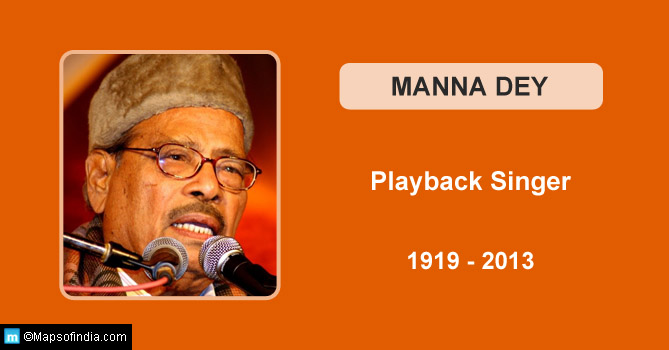Manna Dey Biography
The 24th of October, 2013, will be remembered as the day when India lost one of its finest playback singers. Manna Dey, over the course of his long and inimitable career, recorded an astounding 4,000 songs. He was the recipient of several major awards, including Padma Shri (1971), the fourth-highest civilian award in India.
Birth and Education
Prabodh Chandra Dey, better known as “Manna Dey”, was born to Mahamaya Dey and Purna Chandra on May 1, 1919 in the erstwhile Calcutta. His early education was in a small pre-primary school. Later he went to the Scottish Church Collegiate School and the Scottish Church College, and graduated from the Vidyasagar College, named after the famous Bengali polymath and reformer, Ishwar Chandra Vidyasagar.
In his school days, Dey used to sing purely for entertainment. His practice became serious once he started taking lessons from Krishna Chandra Dey, his uncle, and Ustad Dabir Khan, a famous Veena player. Consequently, he won several singing competitions during his college.
Singing Career
Manna Dey’s career started in 1942 when he started working with his uncle as assistant music director. Then he worked with S. D. Burman, the legendary music composer. A few more stints and soon Dey was working on his own, directing music for Hindi movies. However, his desire for excellence was stronger than ever and he kept taking lessons in classical Hindustani music form living legends such as Ustad Abdul Rahman Khan and Ustad Aman Ali Khan.
Dey got his first playback singing break in the 1942 movie Tamanna, in which he sang a duet called “Jago Aayee Usha, Ponchi Boley Jago”, which became a runaway success. He kept producing playback hits in movies one after the other, such as Kadambari (1944), Kamala (1946), Chaltey Chaltey (1947), Shree 420 (1955), Waqt (1965), and more.
Post Independence, Manna Dey worked with such legendary names as Lata Mangeshkar, Kishore Kumar, and Asha Bhosle, among others. Although he had started with singing classical songs, Dey was soon embracing and weaving fusion, western music, ghazals and other themes into his renditions. By the 1950s, he started composing music regularly.
Death
Aged 94, Manna Dey succumbed to a chest infection that grew increasingly complicated. He was first admitted to the ICU of a hospital in Bengaluru in June 2013; although he seemed to be recovering, his condition finally turned critical and he passed away on October 24 due to a heart attack at 4:30 a.m.
Awards and Honors
Manna Dey received a large number of awards and honors during his career. Some of the prominent ones are:
- Padma Shri Award by Government of India (1971)
- Padma Bhushan Award by the Government of India (2005)
- Lata Mangeshkar Award awarded by Government of Madhya Pradesh (1985)
- Lifetime Achievement award by the Government of Maharashtra (2005)
- First Akshaya Mohanty Award by Government of Orissa (2007)
- Filmfare Lifetime Achievement Award (2011)
- Banga-Vibhushan by Government of West Bengal (2011)
The void created by Manna Dey’s demise can never be filled, but the magnificent legacy of this evergreen music legend will surely live on.

